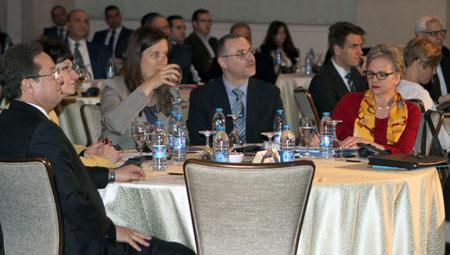You are here
Amman Chamber of Industry, EBRD join forces to help SMEs
By Petra - Mar 16,2016 - Last updated at Mar 16,2016

ACI President Ziad Homsi (right) and Heike Harmgart, EBRD head of office in Amman, sign a memorandum of understanding, on Wednesday (Petra photo)
AMMAN — The Amman Chamber of Industry (ACI) and the European Bank for Reconstruction and Development (EBRD) agreed on Wednesday to cooperate in helping small- and medium-sized enterprises develop through providing support in the administrative, technical and financial fields.
ACI President Ziad Homsi and Heike Harmgart, EBRD head of office in Amman, signed a memorandum of understanding to this effect on the sidelines of a workshop the chamber organised to highlight programmes and services EBRD presents to the industrial sector.
Homsi called on industrialists to benefit from the bank's services such as consultation, loans and grants, noting that the sector faces financing challenges.
He indicated that banks' financing to the sector do not exceed 11 per cent of total loans, with only 3.3 per cent of the credit facilities benefiting the small and medium-sized industries .
Harmgart said EBRD will present comprehensive pack of programmes aimed at helping small and medium projects to succeed, pointing out that funding to schemes in Jordan has reached 500 million euros.
EBRD presents non-refundable grants to cover a basic percentage of a consultation project, with up to 10,000 euros ceiling to local consultations and 50,000 euros to international ones, Harmgart said.
Also on Wednesday, Jordanian Businessmen Association's (JBA) board of directors met with the World Bank's delegates currently visiting the Kingdom, and discussed ways to enhance business environment in Jordan to attract more investments to development zones.
The meeting also discussed the outcomes of the London donor conference, as the bank will provide Jordan with a soft loan to enhance the business environment and develop several areas witnessing the implementation of development and investment projects with additional incentives to help employ Syrian refugees and Jordanian young people.
JBA President Hamdi Tabbaa said the association presented a study on the tax situation in the Kingdom to the government, recommending the gradual change of the entire country into a development zone according to economic circumstances.
He also spoke about the high electricity charges and their negative impact on the competitiveness of the national economy, and the industrial sector in particular.
Related Articles
AMMAN — The European Bank for Reconstruction and Development (EBRD) has invested 550 million euros (around JD445 million) across 27 projects
The European Bank for Reconstruction and Development (EBRD) on Monday officially launched a special unit to help the Kingdom’s small- and medium-sized businesses, which according to a government official struggle to access finance.
AMMAN — President of the European Bank for Reconstruction and Development (EBRD) Odile Renaud-Basso is visiting Jordan from March 27 to 28 t

















